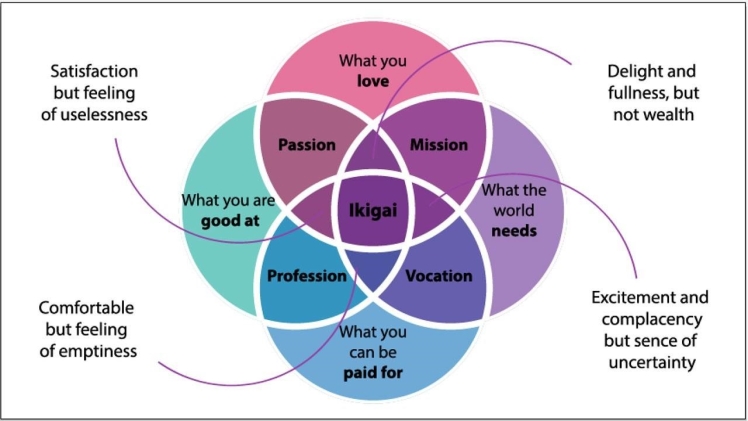Doing What We Love?
Ikigai (sounds icky man) is a Japanese expression that means “why I get up in the morning”. Because the answers to these questions could mean the difference between healing and not healing, life and death. Research has shown that those who find their ikigai have a longer, happier and healthier life. Our ikigai could include our children, work, pets or plants, anything we love and care about. Its healing power lies in shifting our focus from our problems to what we love. This stops the release of stress hormones that can cause harm and activates healing energies.
- Many people seek the Meaning OF Life, thinking that it is the only way to solve their problems. However, this can be a very difficult and often unsuccessful search.
- Our bodies are wired with inbuilt physiological functions that guide us towards survival. We are at this stage where survival is all that matters and we are determined to live.
- However, as we become more aware of the world around us, our need to find additional meaning for survival is stronger. These ikigai factors include curiosity, fear and threat, as well as loss and challenge. Our need to find meaning in life grows as we look for it more.
This is why there is a strong link between ‘Meaning and purpose in life. Living is about Meaning. There may not be one thing that brings meaning to your life. The path to finding additional meaning in life (the ‘how-to’) is called purpose.
Meaning in Life
Our search for more meaning than survival begins with our first look at purpose. We hope that what we do will bring us additional meaning. The initial purposeful orientations we have (e.g. obeying, respecting, and loving) are determined by our parents/caregivers. But as we grow up and become more aware of the world around us, our purpose shifts to satisfying an important perceived need within our contexts.
An intense search for meaning without finding it leads to depression and poorer well-being. People who are more present with meaning are more satisfied and have higher well-being.
What Are the Secrets to Longevity?
When a purpose is identified, it provides meaning for life and gives people a ikigai reason to live. But, a purpose can be transient if it conflicts with other needs or personality characteristics or fails to provide enough meaning in life to satisfy an individual.
- Since the purpose is the main pathway to meaning, crystallization of self-concept tends toward prioritizing values to orient towards the purpose. Interests help develop related skills, which then leads to tasks that satisfy the purpose.
- It is important to understand our purpose, meaning, and negative drives to develop a career. We can better align our career decisions and lives to satisfy our most basic personality motivations, ultimately improving our chances of living a fulfilled and fulfilling life.
- The fact that many people live in these areas is another key to their longevity. According to one scientist at the University of Minnesota, these items kept by Okinawa centenarians were “cabinets of preventative medication.” They contained herbs, spices and fruits as well as vegetables like tomatoes, garlic and scallions. All of them contain compounds that stop cancer from starting.
Great friends can make your life more enjoyable than a great partner. You will cherish your life if you treasure these wonderful relationships.

